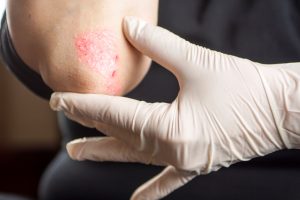Psoriasis Treatments from U.S. Dermatology Partners
What Is Psoriasis?
Psoriasis is a chronic autoimmune inflammatory condition that causes patches of skin to become red, inflamed, and bumpy. This disease affects more than 8 million people in the U.S.
Psoriasis occurs when the immune system mistakes skin cells for a virus or other infection and responds by producing more skin cell growth. This can be triggered by stress, anxiety, injuries to the skin, infections and hormonal changes.
Find This Service Near You
What Causes Psoriasis?
In almost all cases, psoriasis is inherited. You should take the time to explore your family’s history with the condition before visiting a dermatologist.
Psoriasis is a genetic disease in which the immune system becomes hyperactive in a very specific way. Usually, our immune systems are meant to fight infections by recognizing cells and chemicals that are foreign to our bodies. Once our immune systems recognize these foreign invaders, they work to destroy or remove them from our bodies.
In psoriasis, our body’s immune response becomes too active and is not directed at a specific invader. As a result, our bodies have more inflammation than we should. This inflammation affects all of our organ systems, the largest of which is the skin. In many ways, the rash in psoriasis is a window into the body for patients to see how much-uncontrolled inflammation they have.
Who Is at Risk for Psoriasis?
Psoriasis affects both men and women equally. Though it is most common in people between the ages of 15 and 30, and again between the ages of 50 and 60, psoriasis can begin at any time.
People with cardiovascular disease and metabolic syndrome are more likely to develop psoriasis, and it is also believed to be genetic, as individuals who have a parent with psoriasis are 15 percent more likely to develop it.
Psoriasis goes through cycles of improving and worsening, which is called a “flare.”
Some common triggers of outbreaks of psoriasis may include:
- Stress
- Infection (such as strep throat or staph)
- Medications (lithium, beta-blockers, anti-malarial drugs)
- Skin injuries (bruises, shaving, chafing, tattoos or sunburn)
- Other skin conditions (scabies, blisters, dermatitis)
- Cold weather, indoor-heating
- Hormones
- Smoking and excessive drinking
What Are Psoriasis Symptoms?

Psoriasis often occurs on the elbows.
Psoriasis is characterized by dry, scaly flakes on the skin. The skin cells shed and collect on the skin’s surface, causing red, flaky, crusty patches covered in silvery scales. These scales shed easily, and you may also experience intense itching and burning.
Psoriasis mostly occurs on the elbows, knees, lower back and scalp, though patches can appear anywhere.
Are There Different Types of Psoriasis?
There are five common forms of psoriasis:
- Plaque Psoriasis – The most common form of psoriasis. It is often found on the elbows, knees, scalp, or lower back. Affected skin appears red and inflamed with a coating of silvery “plaques.”
- Pustular Psoriasis – Commonly seen on the hands and feet. Appears as areas of redness marked by small white blisters.
- Guttate Psoriasis – Affects almost 10 percent of patients with psoriasis. Inflammation resembles a rash with skin marked by small red dots.
- Inverse Psoriasis – Inverse psoriasis is usually found in skin folds around the body, sometimes around genitals and buttocks. Symptoms commonly include bright red lesions that are smooth and shiny.
- Erythrodermic Psoriasis – The most severe form of psoriasis that affects only 3 percent of those who develop the disorder. Inflammation is widespread, may be painful, and flare-ups require immediate medical attention.
What Are Psoriasis Treatments?
There are several ways to treat psoriasis depending on the severity of your condition.
Systemic therapies include using medications taken either by mouth or injection, while topical treatments are applied directly to the skin and aim to sooth inflammation and slow down the growth of skin cells. Phototherapy, also known as light therapy, uses ultraviolet light to penetrate the skin and slow the growth of cells.
Treatment is generally started with a mild topical cream and progresses to more powerful treatments if necessary.
Every patient will receive a personalized psoriasis treatment plan. We recommend:
- If patients have a few patches of psoriasis, potent topical steroids are the best option.
- For some patients with mild to moderate psoriasis, light therapy (in which patients receive treatment with specific wavelengths of light for short amounts of time) may be the best option.
- For patients with more widespread psoriasis, oral or injectable systemic treatments are the best option. Once the disease becomes widespread and severe, systemic treatments are crucial to not only controlling the skin disease but also the systemic (whole-body) inflammation that can damage other organ systems as well.
Related: Biologics for Psoriasis
Learn How To Treat Psoriasis
What Can I Do to Prevent Psoriasis?

Exercise can help reduce stress, which can trigger an inflammatory reaction.
Psoriasis symptoms may come and go over time. Since there is no known cure, the following steps are recommended to prevent flare-ups:
- Reduce stress, which can trigger an inflammatory reaction.
- Avoid infections and limit your exposure to people who are sick, especially children.
- Eat a healthy diet, as processed foods can create inflammation in the body.
- Maintain a healthy weight. Being overweight or obese can exacerbate psoriasis.
You may also want to talk to a nutritionist and consider taking supplements to boost your overall immune function.
When Should I Work with U.S. Dermatology Partners?
If you suffer from psoriasis, U.S. Dermatology Partners would love to work with you to create a plan to prevent flareups and maintain healthy, beautiful skin. There are U.S. Dermatology Partners locations across Arizona, Colorado, Kansas, Maryland, Missouri, Oklahoma, Texas, and Virginia. Just take a few minutes to fill out our appointment request form. One of our team members will be in touch soon to schedule your visit and answer any questions you have.
*Results may vary by individual
